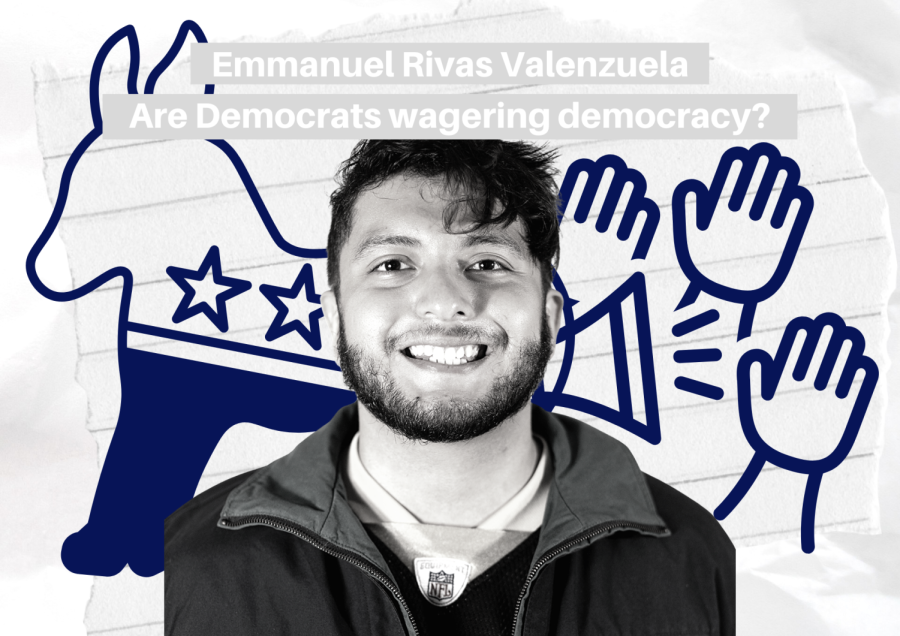With the 2022 election primaries finally in the rear-view mirror, questions are beginning to surface about the Democratic National Committee’s (DNC) approach for the general election.
Coming into this election, left-leaning political action committees (PACs) have funded the primary campaigns of several right-wing extremist candidates across the country. The idea is that if Republican primary voters nominate individuals with extremely conservative views, the general electorate will vote for a more moderate-appearing Democrat candidate.
This strategy seemingly stems from an idea in political science. Named after former House Majority Leader Eric Cantor, the Cantor effect states that whenever an attempt at bipartisanship is made, politicians face the wrath of a partisan primary voter block and lose to a more extreme candidate in the party. In the specific case of Cantor, his close work with Democrats in the latter half of his political career affected his constituents’ views around him. Cantor was beat out in 2014 to primary opponent and Tea Party candidate Dave Brat, according to the New York Times.
Another example of the Cantor effect comes out of the 14th Congressional District of New York where, in 2018, veteran politician and high-ranking House Democrat Joe Crowley lost to the now-controversial figure Alexandria Ocasio-Cortez in their primary bout. A similar premise to the fall of Cantor in 2014, Crowly lost mostly due to his moderate appearance to his primary voters. Cortez was the more progressive candidate out of the two which appealed to the far-left voters in this primary.
The most recent example of the Cantor effect in play, and frankly the most relevant to this upcoming election, is the defeat of Wyoming Congresswoman Liz Cheney. The daughter of former Vice President Dick Cheney lost her primary election to a far-right extremist in Harriet Hageman.
Hageman was backed by former President Donald Trump and has pushed The Big Lie. The Big Lie is the idea that President Joe Biden lost the 2020 Presidential Election, and that Trump is the legitimate Commander in Chief. This idea was a fallacy meant to delegitimize the Biden Administration.
Regardless, Cheney has been a major critic of the former president going as far as to co-chair the Jan. 6 Commitee, which is tasked with investigating Trump’s involvement in the Jan. 6 Insurrection.
Cheney’s involvement in the committee pushed several primary voters, in a state where Trump won by over 50 percent in 2020, to vote for the Trump approved candidate Hageman. Cheney lost her primary by nearly 64,000 votes per the Wyoming Secretary of State.
The DNC has pushed to weaponize the Cantor effect. In races all over the country, far-right candidates have taken money from Democratic PACs. The approach does have precedent in U.S. politics.
In 2012, former Sen. Claire McCaskill won her general election race in Missouri versus Tea Party Republican Todd Akin. Rather than supporting Akin early on; however, McCaskill’s campaign spent millions in the latter half of the general run and ramping up funds during the two weeks leading up to the 2012 general election, according to NPR. McCaskill won her race by just 15 percent. It is difficult to know if McCaskill won strictly because of her campaign’s strategy or because of the high general election turnout. Nonetheless, democratic PACs took the idea and ran with it.
In an interview with NPR’s “All Things Considered,” host Ari Shapiro asked McCaskill what her team was thinking in contributing so much money to her opponent.
“In my situation, there were three viable candidates, and Todd Akin was kind of the weirdest one. I knew he might say some weird things if he were nominated,” said McCaskill. “So, we took a poll, figured out what Republican voters would really like about him, and we spent millions of dollars promoting him by telling Missourians all the things that the Republican primary voters liked about him, but the general election, independent voters did not like about him.”
This approach laid the groundwork for liberal PACs this election.
Take for example the congressional race in California’s 22nd Congressional District, a Republican stronghold. The House Majority PAC, who is heavily affiliated with House Speaker Nancy Pelosi, sent out ads for primary-hopeful, Chris Mathys. In the ads, the House Majority PAC highlighted how great of a conservative he is, and ran as a true conservative backed by Trump.
On his website, Mathys states, “I will do everything possible to restore our conservative values and make sure America never becomes a socialist country.”
According to the New York Times, Mathys did not receive the nomination losing to David Valadao, who voted to impeach Trump after Jan. 6. It would be safe to assume that Valadao secures that congressional seat come November, erasing Democrat’s hopes of flipping that seat.
The great gamble did not pay off in California, but this strategy has played out favorably in other races. Take the current Pennsylvania Gubernatorial Election featuring Democrat Josh Shapiro and Republican Doug Mastriano.
Mastriano fits the mold of who Democrats are trying to force into the general election. Mastriano is anti-choice, anti-LGBTQ+, an election denier and an insurrectionist. Mastriano played a significant role during Jan. 6, providing buses to Washington, D.C. and outright participating in the attack. Democrats successfully helped Mastriano win the Republican nomination, pitting him against Pennsylvania’s current Attorney General Josh Shapiro per NBC News.
This strategy has presented several ethical questions from both sides of the aisle. Some are worried that in enabling such extremist candidates, U.S. politics will continue to appear divisive and drive away even more independent voters in future general elections. Democrats are concerned that, if this plan falls short of success, the result will be a Republican-held House and Senate.
Several conservative pundits wonder if Democrats are resorting to these tactics because they fear their agenda will not resonate with the electorate. Regardless, Democrats are undoubtingly taking a massive risk in enabling such dangerous candidates and placing them so close to power.
Emmanuel Rivas Valenzuela is the sports editor and can be reached at [email protected]: @rivasemmanuel2 on Instagram.











